|
|
|
Sort Order |
|
|
|
Items / Page
|
|
|
|
|
|
|
| Srl | Item |
| 1 |
ID:
115892
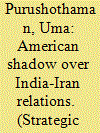

|
|
|
|
|
| Publication |
2012.
|
| Summary/Abstract |
India's ties with Iran have become an irritant in the India-US relationship. Several scholars have alleged that the US is influencing India's Iran policy. This article examines three cases in which the US is said to have influenced India's position: the Iran-Pakistan-India (IPI) pipeline; India's votes against Iran at the International Atomic Energy Agency; and the Reserve Bank of India's guidelines of December 2010, which stopped oil payments to Iran through the Asian Clearing Union. The article concludes that while American pressure on India in each of these cases was tremendous and might have had some influence on India's position, this alone was not the decisive factor that determined India's stance. Given its well-documented tradition of maintaining strategic autonomy in its foreign policy, India would not have taken the positions it did if it had fundamental disagreements with the US on these issues.
|
|
|
|
|
|
|
|
|
|
|
|
|
|
|
|
| 2 |
ID:
115893
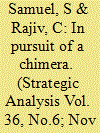

|
|
|
|
|
| Publication |
2012.
|
| Summary/Abstract |
Efforts undertaken to address concerns generated by the Iranian nuclear issue have primarily followed a dual-track approach made up of punitive non-proliferation and economic sanctions at the multi-lateral and unilateral levels and diplomatic-political engagement across the bilateral, tri-lateral and multi-lateral spectrum. These have, however, not been successful in 'forcing' cooperation from Iran on core issues of concern, including in such activities as the stopping of uranium enrichment activities. This is in part due to the mutually reinforcing antagonistic nature of the two-track strategy. While Iranian intransigence has attracted increasingly tough punitive measures, these measures have in turn hardened Iranian positions. They have also been hostage to the nature and content of bilateral relationships that Iran shares with its major interlocutors. While Iran's contentious relationship with the US and the UK and the concomitant trust deficit have bedeviled these efforts, sound strategic/economic reasons underpinning Iran's bilateral ties with Russia and China explain these countries' role as the 'reluctant enforcers'.
|
|
|
|
|
|
|
|
|
|
|
|
|
|
|
|
| 3 |
ID:
115894
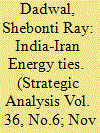

|
|
|
|
|
| Publication |
2012.
|
| Summary/Abstract |
This article looks at relations between Iran and India, with a focus on energy, in the past as well as currently. It will examine the state of the energy sector in Iran in light of the US-sponsored sanctions imposed on the Islamic Republic and the Iranian threat to close off the Strait of Hormuz to shipping. It will analyse what this portends for Iran's position in the international oil and gas market, and the impact this may have on larger India-Iran relations, given that energy is a core factor in their bilateral ties.
|
|
|
|
|
|
|
|
|
|
|
|
|
|
|
|
| 4 |
ID:
115890


|
|
|
|
|
| Publication |
2012.
|
| Summary/Abstract |
The article proposes to trace India's relations with Iran in the post-Cold War period, to identify the highs and lows in its contours and analyse the current situation. No country, however powerful, can formulate and implement its policy towards another in a total vacuum. India's Iran policy, as well as its foreign policy on the whole, reflects its domestic and external concerns and compulsions. India's need to secure its interests and broaden its options is unexceptionable. However, abstaining on Iran's nuclear issue and declining to launch the Israeli spy satellite to monitor Iranian territory would have been well within India's interests and external expectations.
|
|
|
|
|
|
|
|
|
|
|
|
|
|
|
|
| 5 |
ID:
115889
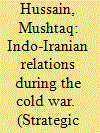

|
|
|
|
|
| Publication |
2012.
|
| Summary/Abstract |
India and Iran have shared a rich history of civilisational ties for many centuries. The close historical relations were, however, ruined by the British rule and the subsequent loss of contiguity owing to the creation of Pakistan. Iran's alliance with the Western bloc and India's adherence to the principles of non-alignment, albeit with leanings towards the Soviet Union, were the major determinants of Indo-Iranian bilateral relations until 1979. Pakistan, and its impression on the successive Iranian regimes, also played a major role in this relationship. The Islamic Revolution of 1979 changed the situation dramatically, with Iran overnight becoming a staunch US foe. The ensuing Iran-Iraq war and the Soviet Union's invasion of Afghanistan then acted as further spoilers for the development of cordial ties between India and Iran. Extraneous factors continually prevented Indo-Iranian political relations from maturing. Economic relations, in turn, were held hostage and remained far from substantive.
|
|
|
|
|
|
|
|
|
|
|
|
|
|
|
|
| 6 |
ID:
115887
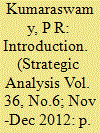

|
|
|
| 7 |
ID:
115888


|
|
|
|
|
| Publication |
2012.
|
| Summary/Abstract |
One of the most difficult tasks facing the foreign policy makers in India is the requirement to balance the relations with Iran while enhancing proximity with the United States. This invariably raises questions over the importance of Iran. An ancient civilisation, Iran is located at the crucial junction of South Asia and the Middle East. It also links the Central Asian Republics and the Caucasus region to the Arabian Sea. Historically, it has influenced its neighbours, irrespective of the type of government in power. One of the oldest continuously inhabited civilisations, it forms a bridge between the Semitic world and the Indo-Aryan civilisation of South Asia and has had strong historical linkages with India. This article looks at the strategic importance of Iran for India.
|
|
|
|
|
|
|
|
|
|
|
|
|
|
|
|
| 8 |
ID:
115896
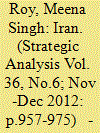

|
|
|
|
|
| Publication |
2012.
|
| Summary/Abstract |
Most of the discourses on India-Iran relations are either focused on cultural and civilisational links with Iran or its relevance as an energy-rich nation. Its transit potential in providing India with access to Central Asia has not received adequate attention. While there is a general acceptance that Iran provides India with access to Central Asia, what is little known and thus not analysed is the question: to what extent has India been able to realise Iran's transit potential and what are the major bilateral, regional and international challenges faced by both these countries for realising that potential? The article argues that despite Iran's geostrategic location as well as regional complexities, the Iran-US standoff, security challenges and lack of adequate economic resources constrain India's efforts to maximise the potential offered by the various land, sea and rail routes connecting India to the Eurasian region through Iran. A new thrust by all regional partners supported by international agencies to revive old links and build new corridors therefore becomes necessary.
|
|
|
|
|
|
|
|
|
|
|
|
|
|
|
|
| 9 |
ID:
115897


|
|
|
|
|
| Publication |
2012.
|
| Summary/Abstract |
Political tensions and rivalry between Iran and Israel have cast a shadow over India's bilateral relations with both these countries. While one offers energy security, the other provides military-security capability towards ensuring greater Indian influence in the Middle East. Conscious of their relative advantages and challenges, India has managed to maintain a fine balance in its relations with Iran and Israel. Despite the suspected involvement of Iranian citizens in the 13 February 2012 terror attack on the Israeli embassy vehicle in New Delhi, Israel could continue to be a marginal player in Indo-Iranian relations. The same, however, will not be true for the US, which seeks to limit and if possible change the substance and direction of Indo-Iranian relations.
|
|
|
|
|
|
|
|
|
|
|
|
|
|
|
|
| 10 |
ID:
115891
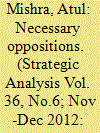

|
|
|
|
|
| Publication |
2012.
|
| Summary/Abstract |
For the longest part of the two decades since the end of the Cold War, there were mostly Indian perspectives, rather than debates, on Iran and bilateral relations. Domestic debates on Iran began in 2005 and continued until mid-2008, reaching a crescendo during this period and dissipating soon after. The debates, when they took place, were not about influencing the government's Iran policy. Rather they were the necessary oppositions that emerged from specificities of India's domestic politics in which coalition compulsions, parliamentary democracy and ideological differences played their part.
|
|
|
|
|
|
|
|
|
|
|
|
|
|
|
|
| 11 |
ID:
115895
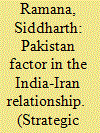

|
|
|
|
|
| Publication |
2012.
|
| Summary/Abstract |
India's relationship with Iran has been uneven owing to external factors. This article traces the role of the Pakistan factor in this relationship, wherein the religious identity of a fellow Islamic nation, the strategic outlook towards Afghanistan, and energy relations between the three countries are discussed. The article outlines the Pakistani primacy in the India-Iran strategic relationship and showcases how Afghanistan is the glue for India-Iran relations despite the breaks in their continuing relationship. The article concludes by providing an overview of this unique triangular relationship, assessing the wider interests of the parties involved.
|
|
|
|
|
|
|
|
|
|
|
|
|
|
|
|
|
|
|
|
|